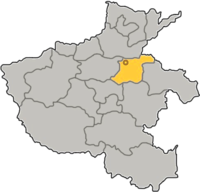| Jingkang Incident | |||||||||
|---|---|---|---|---|---|---|---|---|---|
| Part of the Jin–Song Wars | |||||||||
 Bianjing on the map of modern Henan | |||||||||
| |||||||||
| Belligerents | |||||||||
| Northern Song dynasty | Jin dynasty | ||||||||
| Commanders and leaders | |||||||||
| Emperor Qinzong of Song |
Emperor Taizong of Jin Nianhan Wolibu | ||||||||
| Strength | |||||||||
|
First siege: 200,000 Second siege: 70,000 |
First siege: 100,000 Second siege: 150,000 | ||||||||
| Casualties and losses | |||||||||
| Many members of the Song imperial family and their servants abducted. Civilians in Bianjing forced to pay massive ransoms in valuable treasures and precious metals for safety. | Unknown | ||||||||
The Jingkang Incident (Chinese: 靖康事變; pinyin: Jìngkāng shì biàn), also known as the Humiliation of Jingkang (靖康之恥; Jìngkāng zhī chǐ) and the Disorders of the Jingkang Period (靖康之亂; Jìngkāng zhī luàn),[1] was an episode of invasions and atrocities that took place in 1127 during the Jin–Song Wars when the troops of the Jurchen-led Jin dynasty besieged and sacked the imperial palaces in Bianjing (present-day Kaifeng), the capital of the Han-led Northern Song dynasty. The Jin forces captured the Northern Song ruler, Emperor Qinzong, along with his father, the retired Emperor Huizong, and many members of the imperial family of Emperor Taizong's bloodline and officials of the Song imperial court. The ordinary Song civilians of Bianjing living in the non-imperial quarter were left alone after being forced to pay huge ransoms to the Jin.
This event marked the collapse of the Northern Song dynasty that originally controlled most of China proper. Many members of the Song imperial family, most notably Zhao Gou (later Emperor Gaozong), managed to escape to southern China,[2] where they reestablished the Song dynasty (known in historiography as the Southern Song dynasty) in the new capital, Lin'an (present-day Hangzhou). This event also greatly contributed to the return of the descendants of Emperor Taizu to the line of succession, as most of Emperor Taizong's descendants were abducted; Emperor Gaozong himself failed to produce an heir as well. This event is known as the "Jingkang Incident" because it took place during the Jingkang era of the reign of Emperor Qinzong.
- ^ Coblin, W. South (2002). "Migration History and Dialect Development in the Lower Yangtze Watershed". Bulletin of the School of Oriental and African Studies. 64 (3): 533. doi:10.1017/s0041977x02000320 (inactive 1 November 2024).
{{cite journal}}: CS1 maint: DOI inactive as of November 2024 (link) - ^ Chaffee, John W. (1999). Branches of Heaven: A History of the Imperial Clan of Sung China. Vol. 183 of Harvard East Asian monographs (illustrated ed.). Harvard Univ Asia Center. p. 120. ISBN 0674080491. ISSN 0073-0483.